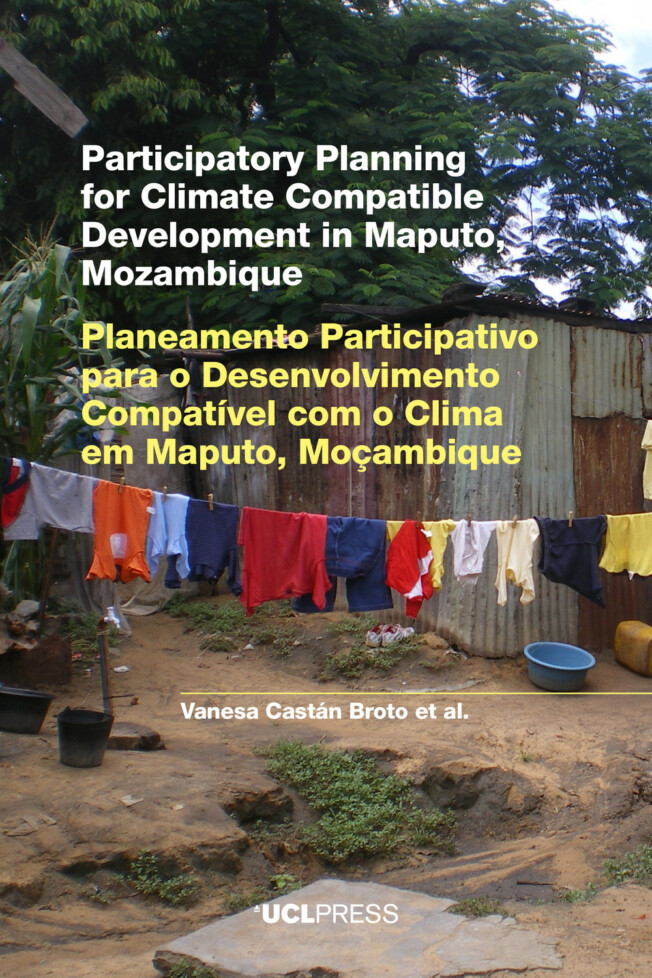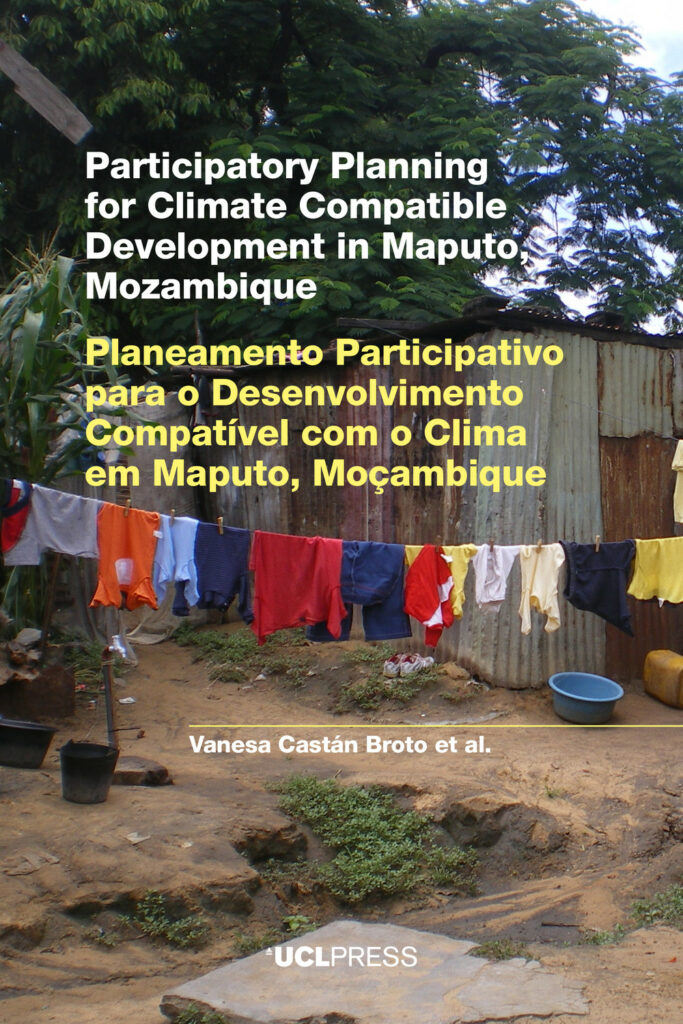
Participatory Planning for Climate Compatible Development in Maputo, Mozambique
Vanesa Castán Broto (Editor), Jonathan Ensor (Editor), Emily Boyd (Editor), Charlotte Allen (Editor), Carlos Seventine (Editor), Domingos Augusto Macucule (Editor), Christiana Figueres, UNFCCC Executive Secretary (Foreword)
Participatory Planning for Climate Compatible Development in Maputo, Mozambique is a practitioners’ handbook that builds upon the experience of a pilot project that was awarded the United Nations ‘Lighthouse Activity’ Award.
Building upon a long scholarly tradition of participatory planning, this dual-language (English/Portuguese) book addresses crucial questions about the relevance of citizen participation in planning for climate compatible development and argues that citizens have knowledge and access to resources that enable them to develop a sustainable vision for their community. In order to do so, the author proposes a Participatory Action Planning methodology to organise communities, and also advances mechanisms for institutional development through partnerships.
Foreword by Christiana Figueres, UNFCCC Executive Secretary
Acknowledgments
Introduction
1 Incorporating Climate Change Knowledge in Participatory Planning
2 Co-constructing CCD Knowledge through Participatory Action Planning
3 Building Partnerships for Climate Compatible Development
4 Conclusion and Ways Forward
References
Index
DOI: 10.14324/111.9781910634202
Number of pages: 212
Number of illustrations: 40
Publication date: 01 November 2015
PDF ISBN: 9781910634219
EPUB ISBN: 9781910634226
Read Online ISBN: 9781911307204
Hardback ISBN: 9781910634196
Paperback ISBN: 9781910634202
Vanesa Castán Broto (Editor) 
Vanesa Castán Broto is Professor of Climate Urbanism at the Urban Institute, University of Sheffield.
Jonathan Ensor (Editor)
Jonathan Ensor is a Senior Researcher in Sustainable Development at the Stockholm Environment Institute, University of York. His work focuses on community-based adaptation and the potential for development and governance processes to integrate power and social justice with resilience thinking.
Emily Boyd (Editor)
Emily Boyd is Professor of Resilience Geography at the Department of Geography and Environmental Science, University of Reading. Her work focuses on how poverty, collective action and institutions shape resilience in ways that help societies to anticipate or adapt livelihoods under a changing global environment
Charlotte Allen (Editor)
Charlotte Allen is an urban planner with almost 30 years’ experience of working in Mozambique. In 2011–2013 she facilitated and documented the fieldwork for the participatory action plan in the Chamanculo C neighbourhood of Maputo.
Carlos Seventine (Editor)
Carlos Seventine is the executive secretary of the National Environment Fund of Mozambique (FUNAB).
Domingos Augusto Macucule (Editor)
Domingos Macucule teaches planning at the Universidade Eduardo Mondlane, Maputo, Mozambique. His research studies processes of urban governance in peri-urban settlements in Maputo.
Christiana Figueres, UNFCCC Executive Secretary (Foreword)
‘This English/Portuguese book is an example of how participatory planning, which puts citizens at the heart of community improvement, can facilitate local responses to climate change challenges. Focusing on the partnerships between governments and communities in Maputo, Mozambique, this bilingual compilation highlights key lessons of climate compatible development for urban managers, practitioners, academics, policy makers, citizens and activists.’
Environment and Urbanization Journal
‘The book ‘Participatory Planning for Climate Compatible Development’ advances a key argument concerning the need to involve urban citizens in local action for climate adaptation.’
Climate and Development Knowledge Network
‘This book is a guiding light for planners, communities and anyone concerned with climate change in our cities. It will join a growing but still limited collection of studies and is likely to become an important guide to living in our climate-changed present. Participatory action planning might not be the only way to involve urban residents in addressing this new landscape, but it offers a deeply considered approach that is needed across Maputo and cities more widely.’
Africa at LSE Book Reviews
‘This book is accessible in the best sense of the term and yet offers complex ideas and challenges to traditional planning norms that have shaped a geography of vulnerability across the city. The book is fully referenced and behind each section lies a series of interesting ideas from disciplines including urban studies, planning, climate science, development studies, geography and others, brought together to anchor the reflections on the process described in the book.
Part of the success of the book can be attributed to the use of clear figures, tables and explanatory boxes that offer an alternative to pages of text. With over 20 full colour photos of Chamanculo C, the reader gets a real understanding of this poor but popular neighbourhood and the challenges it faced in relation to climate change. These include the textured nature of the area’s development and its people that help bring the particular topographies of climate change to a neighbourhood level. The key lessons that conclude each chapter add to this accessibility and illustrate how it might be used by policymakers pressed for time and more inclined to search for the highlights of such publications.
The dual English/Portuguese language is perhaps the most prominent component of the book that illustrates the attention and ethical care that has gone into both the research process and the reflective writing that the reader encounters. All too often publications about African cities are written in English, limiting the audience and failing to connect with local policymakers and concerned citizens….
This book is a guiding light for planners, communities and anyone concerned with climate change in our cities. It will join a growing but still limited collection of studies and is likely to become an important guide to living in our climate-changed present. Participatory action planning might not be the only way to involve urban residents in addressing this new landscape, but it offers a deeply considered approach that is needed across Maputo and cities more widely’
Related titles
Rethinking Urban Risk and Resettlement in the Global South
Cassidy Johnson, Garima Jain, Allan Lavell,
10 June 2021
Participatory Planning for Climate Compatible Development in Maputo, Mozambique
Participatory Planning for Climate Compatible Development in Maputo, Mozambique is a practitioners’ handbook that builds upon the experience of a pilot project that was awarded the United Nations ‘Lighthouse Activity’ Award.
Building upon a long scholarly tradition of participatory planning, this dual-language (English/Portuguese) book addresses crucial questions about the relevance of citizen participation in planning for climate compatible development and argues that citizens have knowledge and access to resources that enable them to develop a sustainable vision for their community. In order to do so, the author proposes a Participatory Action Planning methodology to organise communities, and also advances mechanisms for institutional development through partnerships.
‘This English/Portuguese book is an example of how participatory planning, which puts citizens at the heart of community improvement, can facilitate local responses to climate change challenges. Focusing on the partnerships between governments and communities in Maputo, Mozambique, this bilingual compilation highlights key lessons of climate compatible development for urban managers, practitioners, academics, policy makers, citizens and activists.’
Environment and Urbanization Journal
‘The book ‘Participatory Planning for Climate Compatible Development’ advances a key argument concerning the need to involve urban citizens in local action for climate adaptation.’
Climate and Development Knowledge Network
‘This book is a guiding light for planners, communities and anyone concerned with climate change in our cities. It will join a growing but still limited collection of studies and is likely to become an important guide to living in our climate-changed present. Participatory action planning might not be the only way to involve urban residents in addressing this new landscape, but it offers a deeply considered approach that is needed across Maputo and cities more widely.’
Africa at LSE Book Reviews
‘This book is accessible in the best sense of the term and yet offers complex ideas and challenges to traditional planning norms that have shaped a geography of vulnerability across the city. The book is fully referenced and behind each section lies a series of interesting ideas from disciplines including urban studies, planning, climate science, development studies, geography and others, brought together to anchor the reflections on the process described in the book.
Part of the success of the book can be attributed to the use of clear figures, tables and explanatory boxes that offer an alternative to pages of text. With over 20 full colour photos of Chamanculo C, the reader gets a real understanding of this poor but popular neighbourhood and the challenges it faced in relation to climate change. These include the textured nature of the area’s development and its people that help bring the particular topographies of climate change to a neighbourhood level. The key lessons that conclude each chapter add to this accessibility and illustrate how it might be used by policymakers pressed for time and more inclined to search for the highlights of such publications.
The dual English/Portuguese language is perhaps the most prominent component of the book that illustrates the attention and ethical care that has gone into both the research process and the reflective writing that the reader encounters. All too often publications about African cities are written in English, limiting the audience and failing to connect with local policymakers and concerned citizens….
This book is a guiding light for planners, communities and anyone concerned with climate change in our cities. It will join a growing but still limited collection of studies and is likely to become an important guide to living in our climate-changed present. Participatory action planning might not be the only way to involve urban residents in addressing this new landscape, but it offers a deeply considered approach that is needed across Maputo and cities more widely’

